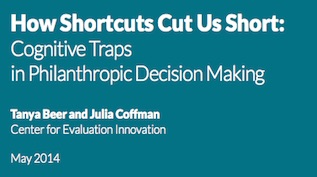How shortcuts cut us short: Cognitive traps in philanthropic decision making

Cognitive traps can hinder any decision a foundation makes about its strategies. This includes how to construct a theory of change to address it, and which grantees are best suited to do the work. It also includes decisions made during implementation, such as whether strategy adjustments are needed or whether to renew funding for certain activities or grantees.
Five cognitive traps that commonly affect philanthropy are described in this report from the Center for Evaluation Innovation. For each, examples are included to show where in the grantmaking cycle foundations might be particularly vulnerable.
